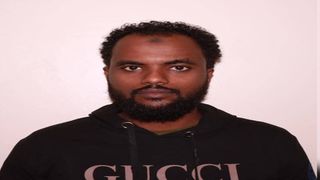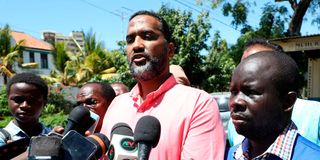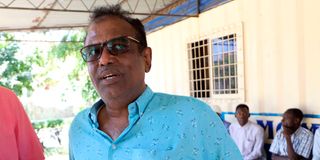
Zakariya Kamala Sufi Abashiekh, aka Sakaria Kamal. His family says he went missing on September 5.
|News
Premium
Zakariya Abashiekh: From school prefect to suspected Al-Shabaab armourer
What you need to know:
- Abashiekh hit the headlines last week when he went missing in Mombasa, only for Somali intelligence to later announce that he had been arrested in their country
- His school records show he was a disciplined and responsible student with leadership qualities, having served as a class prefect in his senior year
- Those who know him describe Abashiekh as a good person, and his alleged involvement in criminal activities seems to have taken them by surprise
Born in Mombasa 28 years ago, little was known about Zakariya Kamal Sufi Abashiekh until April this year, when he was arrested for allegedly providing logistical support to the Somalia-based terrorist group Al-Shabaab by supplying them with weapons and other essential materials.
Abashiekh hit the headlines last week when he went missing in Mombasa, only for Somali intelligence to later announce that he had been arrested in their country while allegedly trying to hide in areas controlled by the terrorist group.
But his family believes he was abducted in Mombasa and handed over to Somali authorities, and they now want the Kenyan government to bring him back to face trial in the country.
According to documents seen by the Nation, Abashiekh was born on June 13, 1993 in Ganjoni, Mombasa.
He attended Arya Primary School before joining Mvita Boys Secondary School, where he scored a C (plain) in the 2012 Kenya Certificate of Secondary Education (KCSE) exams.
His school records show he was a disciplined and responsible student with leadership qualities, having served as a class prefect in his senior year.
The headmaster praised him for his obedience, hard work and excellent performance in his duties as class prefect.
During his time at high school, Abashiekh actively participated in football and was also a member of the Wildlife Club. At the time, there was no indication that he would later be associated with one of the world's most dangerous terrorist organisations.
Those who know him describe Abashiekh as a good person, and his alleged involvement in criminal activities seems to have taken them by surprise.

Yusuf Sufi Abasheikh, the uncle of Zakariya Kamal Sufi, a Kenyan businessman who police suspect was illegally shipping military equipment to Somalia addressing the press outside the Mombasa Law Courts on October 02, 2023.
After graduating from high school, Abashiekh studied engineering at the Zhejiang University of Science and Technology in China, where he spent five years and graduated with a Bachelor of Computer Science and Technology.
“The Degree Awarding Committee, in accordance with The Regulations Concerning Academic Degree in the People’s Republic of China, has conferred upon Zakariya Kamal Sufi the degree of Engineering Bachelor of Computer Science and Technology with all its rights, privileges and honors, given at Hangzhou, China, on 20th day of June 2018,” reads part of his academic document.
His family is still reeling from the latest revelations, baffled as to how their son came to be associated with terrorists as a middleman providing logistical support.
His family says nothing in his behaviour prepared them for the devastating allegations that their son was working for Al-Shabaab.
Sources say Abashiekh started a small business in China, which eventually expanded to East Asia.
Police suspect that it was through this business that he met al-Shabaab sympathisers and eventually provided them with logistical support.
However, his relatives dispute the claim that their son had ever been to Somalia.
According to his father, Mr Kamal Sufi, his son had never been to Somalia, so he was surprised to hear the news of his arrest in the Horn of Africa country.
"I was confused. I know my son. I am always with him, and I can assure you that he has never been to Somalia,” he told The Nation in an exclusive interview.
However, he confirmed that Abashiekh also ran a logistics business, transporting goods from China.
"He would assist anyone who wanted to order items from China, earning a commission for his work. He specifically dealt with customers who wanted to order goods in large quantities for wholesale," his father explained.
His father described him as a good man who never had any disciplinary problems at school or in the neighbourhood where he grew up.

Kamal Sufi, the father of Zakariya Kamal Sufi, a Kenyan businessman who police suspect was illegally shipping military equipment to Somalia on October 2, 2023.
Before his arrest, Abashiekh ran a cosmetics shop and a ready-made garment business at Marikiti market in Mombasa's central business district. His father had opened a shop for him there after he finished his studies in China.
"We are a religious family, so our children are expected to set a good example in the neighbourhood. That's how my son has always been," said his father.
He pleaded with the government to bring his son back to Kenya for trial so that he can face the consequences of any crimes he may have committed on home soil.
"I am urging the government to repatriate Kamal back to Kenya for trial. I don't want him to be tried in a foreign land where he could be harmed. I want him to be tried in Kenya, where the charges against him can be proven, and he can either be jailed or acquitted based on the available evidence. I will accept whatever the outcome," he said.
Abashiekh had initially expressed concern for his safety at the Shanzu court when he was arrested in April.
He claimed to have received death threats shortly after his arrest. Although he did not reveal the names behind the alleged threats, he said he believed the threats came from powerful individuals.
The suspect, who was out on Sh1 million bail, had been reporting regularly to the Anti-Terror Police Unit (ATPU) headquarters as investigations continue.
On September 5, he disappeared while returning home from work at 5pm. Video footage obtained by The Nation shows him being abducted in Mombasa CBD by suspected security agents in civilian clothes, who forced him into a white Land Cruiser.
At the time of the incident, Abashiekh was in a friend's vehicle. The disappearance was reported to the Central Police Station.
Somalia's National Intelligence and Security Agency (NISA) reported his arrest last Friday, stating that he was responsible for procuring weapons and explosives from foreign sources to arm Al-Shabaab and harm Somali nationals.
According to NISA, the suspect had been under their surveillance for some time. They also alleged that he was the mastermind of a network involved in the illegal procurement of a military container from abroad.
Kenyan security agencies were investigating him over the shipment seized at Mogadishu port, which included five advanced JS crop drones capable of carrying 10 litres of liquid up to 500 metres above sea level and covering an area of 10 hectares.
Other items included rifle scopes, military uniform fabrics, canvas for tents, night vision goggles, swim goggles, voice recording pens, spy goggles and watches, military-grade two-way radios, helmets, ghillie suits (camouflage), portable solar panels, flashlights and batteries.






